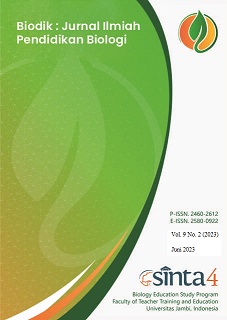Pengaruh Startegi Pebelajaran Kooperatif Model Snowball Throwing Terhadap Hasil Belajar Siswa Pada Materi Siswa Pencernaan Makanan Kelas XI
(The Effect of The Snowball Throwing Model's Cooperative Learning Strategy on Student Learning Outcomes on Class Xi Food Digestion Student Material)
DOI:
https://doi.org/10.22437/biodik.v9i2.19786Abstract
This research begins with the phenomenon revealed in the data on science ability on an international level that Indonesia is ranked 50 out of 57 countries. This is an indication that students' learning abilities are still in the low category and must be improved. In addition, according to data on learning outcomes at SMAS Budisatrya Medan, many are below the KKM. This condition is influenced by learning models that are less varied, student activity has decreased and exploration of information is not optimal. The purpose of this study was to determine whether the application of the cooperative learning model with snowball throwing was able to improve student learning outcomes in class XI IPA 1 at SMAS Budisatrya. This research is in the form of a quasi-experiment with a pretest-posttest group design model. To test the hypothesis, it is done with Independent sample t test and N-Gain test. The result turned out to have a positive effect on the increase in student learning outcomes.
Key words: Cooperative Learning Strategy Snowball Throwing Model, Food Digestion, Science, Learning Outcomes
Â
ABSTRAK
Penelitian ini diawali dengan adanya fenomena yang diungkap dalam data kemampuan IPA secara peringkat Internasional bahwa Indonesia berada pada peringkat 50 dari 57 negara. Hal tersebut menjadi indikasi bahwa kemampuan belajar siswa masih dalam kategori rendah dan harus ditingkatkan. Selain itu sesuai dengan data hasil belajar di SMAS Budisatrya Medan banyak dibawah KKM. Kondisi tersebut dipengaruhi oleh model pembelajaran yang kurang bervariatif, keaktifan siswa mengalami penurunan dan eksplorasi informasi yang tidak maksimal. Tujuan penelitian ini untuk mengetahui apakah penerapan model pembelajaran kooperatif dengan snowball throwing mampu meningkatkan hasil belajar siswa kelas XI IPA 1 di SMAS Budisatrya. Penelitian ini berbentuk eksperimen semu dengan model pretest-postest group design. Untuk pengujian hipotesisnya dilakukan dengan Independent sample t test dan uji N-Gain. Hasilnya ternyata berpengaruh positif terhadap kenaikan hasil belajar siswa.
Kata kunci: Strategi Pembelajaran Kooperatif Model Snowball Throwing, Pencernaan Makanan, IPA, Hasil Belajar
Downloads
References
Andriko, F. (2018). Pengaruh Kombinasi Model Pembelajaran Eksplisit Instruction dan Snowball Throwing Terhadap Hasil Belajar Biologi Siswa Pada Materi Sel Kelas Xi IPA di SMA 1 X Koto Singkarak (Vol. 7, Issue 2). IAIN Batusangkar.
Anitah, S. (2013). Teknologi Pembelajaran. Yuma Pustaka.
Arikunto, S. (2013). Prosedur Penelitian: Suatu Pendekatan Praktik. Rineka Cipta.
Asmariati. (2020). Penerapan Model Pembelajaran Kooperatif Tipe Snowball Throwing Untuk Meningkatkan Aktivitas Dan Hasil Belajar Siswa. Jurnal Kinerja Kependidikan, 2(4), 723–744.
Handayani, T., Mujasam, Widyaningsih, S. W., & Yusuf, I. (2017). Penerapan Model Pembelajaran Kooperatif Tipe Snowball Throwing Terhadap Hasil Belajar Peserta Didik. Jurnal Curricula, 2(1), 47–58. https://doi.org/10.23887/mi.v24i3.21677
Kusumawati, N. (2017). Pengaruh model pembelajaran kooperatif dengan snowball throwing terhadap hasil belajar ipa pada siswa kelas iv sdn bondrang kecamatan sawoo kabupaten ponorogo. Jurnal Kependidikan Dasar Islam Berbasis Sains, 2(1), 1-12.
Porat, E., Blau, I., & Barak, A. (2018). Measuring digital literacies: Junior high-school students’ perceived competencies versus actual performance. In Computers and Education (Vol. 126). Elsevier Ltd. https://doi.org/10.1016/j.compedu.2018.06.030
Rajagukguk, S. (2020). Perbandingan Hasil Belajar Siswa Dengan Menggunakan Model Pembelajaran Snowball Throwing Dan Talking Chips Pada Materi Sistem Ekskresi Di Kelas XI SMA Negeri 1 Sidamanik Tahun Pelajaran 2017/2018. Jurnal Metabio, 2(1), 1–9.
Rasyid, M., & Side, S. (2011). Pengaruh Penerapan Pembelajaran Snowball Throwing terhadap Hasil Belajar Siswa Kelas X SMAN I Bajeng Kab. Gowa (Studi pada Materi Pokok Senyawa Hidrokarbon) The. Jurusan Kimia FMIPA UNM, XXI(1), 69–76.
Siahaan, K. W. A., Damanik, D. H. S., Tambunan, S. S., Simanjuntak, M., & Sihombing, D. (2021). Implementasi model quantum teaching dan metode snowball throwing terhadap minat dan prestasi belajar kimia. Jurnal ekonomi, sosial & humaniora, 2(07), 16-24.
Sugiyono. (2019). Metode Penelitian Kuantitatif, Kualitatif dan R&D (Sutopo (ed.)). Alfabeta.
Susanto, A. (2014). Teori Belajar dan Pembelajaran. Kencana.
Tarigan, M. R. M., Manalu, A. W., Tanjung, H. E., Saragih, J. S., & Ula, A. (2020). Pengaruh Model Snowball Throwing Terhadap Hasil Belajar Siswa Pada Materi Sistem Pertahanan Tubuh Di Sma Swastamedan. Jurnal Biolokus, 3(2), 313–319. https://doi.org/10.31004/basicedu.v4i2.37
Downloads
Published
How to Cite
Issue
Section
License
Copyright (c) 2023 Rizki Putri Ananda Srg, Wulan Purnama Sari Vinia, Deni Puspita Sari, City Qurnia Sari Pohan, Siti Fauziah, Dwike Amalia Azzahra

This work is licensed under a Creative Commons Attribution-NonCommercial-ShareAlike 4.0 International License.
Copyright Notice
Authors who publish with Biodik : Jurnal Ilmiah Pendidikan Biologi agree to the following terms:
- For all articles published in Biodik : Jurnal Ilmiah Pendidikan Biologi, copyright is retained by the authors and grant the journal right of first publication with the work simultaneously licensed under a Creative Commons Attribution-ShareAlike 4.0 International Licensethat allows others to share the work with an acknowledgment of the work's authorship and initial publication in this journal.
- Authors are able to enter into separate, additional contractual arrangements for the non-exclusive distribution of the journal's published version of the work (e.g., post it to an institutional repository or publish it in a book), with an acknowledgment of its initial publication in this journal.
- Authors are permitted and encouraged to post their work online (e.g., in institutional repositories or on their website) prior to and during the submission process, as it can lead to productive exchanges, as well as earlier and greater citation of published work (See The Effect of Open Access).
















